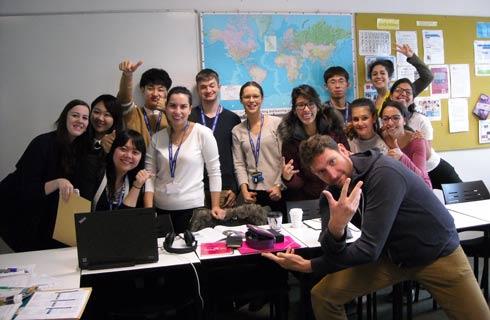- IDP China>
- 课程库>
- 工程与技术>
- 工程>
- 生物医学工程>
- Doctor of Philosophy in Electrical and Computer Engineering - Biomedical Engineering
电气与计算机工程哲学博士-生物医学工程
Doctor of Philosophy in Electrical and Computer Engineering - Biomedical Engineering

学历文凭
Ph.D.

专业院系
Department of Electrical and Computer Engineering

开学时间

课程时长

课程学费

国际学生入学条件
IDP—雅思考试联合主办方

雅思考试总分
6.5
- 雅思总分:6.5
- 托福网考总分:80
- 托福笔试总分:160
- 其他语言考试:PTE (Academic) - 60 (writing 60, speaking 60)
CRICOS代码:
申请截止日期: 请与IDP联系 以获取详细信息。
课程简介
Electrical and computer engineers shape the future through innovation. They develop and improve systems that serve everyday needs of society spanning from high-voltage engineering and sustainable energy, to breakthroughs in wireless technology. Our faculty and students do everything from creating low-cost digital x-ray imagers to combat tuberculosis in developing countries, to building real-time embedded systems to advance the design and reliability of commercial products. The Department of Electrical and Computer Engineering (ECE) is founded on leading engineering education and research, a world-renowned co-operative study program, and a bold history of innovation. Waterloo Engineering is ranked among the top 50 engineering schools in the world; our ECE department is committed to sustaining that excellence in our areas of research while venturing into growing areas of opportunity. We attract the best and brightest students and faculty from around the globe, and our graduates are recruited worldwide by leading engineering firms, corporations, government agencies, and research-intensive universities. A Doctor of Philosophy (PhD) degree is ideal for students pursuing a career in fundamental or applied research in academia, government, or corporate environments.The main thrust in this area is the application of electromagnetics to a wide range of engineering systems and devices including antennas, circuits and systems over the RFmicrowave, millimeter-waveTHz, and optical range of frequencies.
相关申请
 预科
预科 奖学金
奖学金 实习机会
实习机会 在校学习
在校学习 跨境学习
跨境学习 校园授课-线上开始
校园授课-线上开始 在线/远程学习
在线/远程学习
开学时间&学费
学费信息仅供参考,请与IDP联系以获取详细信息
| 开学时间 | 时长 | 学费 | 地点 |
|---|
学校排名

世界排名201
数据源:
泰晤士高等教育世界大学排名
关于滑铁卢大学

滑铁卢大学是加拿大滑铁卢市的一家著名大学,是一所以研究为主的中等大小的公立大学,创建于1957年。以数学、计算机科学、工程学而闻名。该校位于安大略省的西南面的滑铁卢市,占地面积约为1000英亩。滑铁卢大学成立至今,仅数十年便跻身加拿大名校之列,是加拿大发展最快的学校。2011年到2013年,该校一直稳居麦克林杂志评选的加拿大综合性大学排名的第三位,是北美地区最优大学之一,其数学,计算机科学和工程学科教学水平居世界前列。特别是做为北美地区第一个经认可建立数学系的大学,拥有世界上最大的数学系以及世界上最大的合作办学项目。学校共授予100多个本科学位专业,28种硕士及博士学位专业,学校的代表队曾多次获得ACM 国际大学生程序设计竞赛的冠军。
本校相关课程

系统设计工程哲学博士
学历文凭
Ph.D.
开学日期
课程费用总额


系统设计工程工程学硕士
学历文凭
Masters Degree
开学日期
课程费用总额


社会学文学硕士[仅课程]
学历文凭
Masters Degree
开学日期
课程费用总额


Doctor of Philosophy in Religious Studies
学历文凭
Ph.D.
开学日期
课程费用总额


运动机能学博士-工作与健康
学历文凭
Ph.D.
开学日期
课程费用总额


娱乐与休闲研究哲学博士
学历文凭
Ph.D.
开学日期
课程费用总额

其他相关课程

生物医学工程应用科学硕士
 达尔豪斯大学
达尔豪斯大学学历文凭
Masters Degree
开学日期
课程费用总额


生物医学工程技术文凭
 北阿尔伯塔理工学院
北阿尔伯塔理工学院学历文凭
Bachelor Degree
开学日期
课程费用总额


生物医学工程学士学位
 多伦多都会大学
多伦多都会大学学历文凭
Bachelor Degree with Honours
开学日期
课程费用总额


生物医学工程应用科学硕士
 渥太华大学
渥太华大学泰晤士高等教育世界大学排名:188
学历文凭
Masters Degree
开学日期
课程费用总额


工程科学应用科学学士-生物医学工程(荣誉学位)
 西蒙菲莎大学
西蒙菲莎大学学历文凭
Bachelor Degree with Honours
开学日期
课程费用总额


生物医学工程学硕士
 卡尔加里大学
卡尔加里大学学历文凭
Masters Degree
开学日期
课程费用总额










